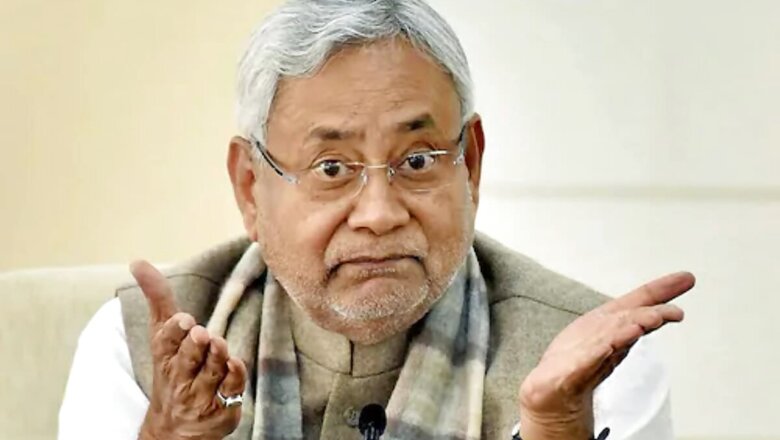
views
Facing flak over the deteriorating law-and-order situation in the state, Bihar chief minister Nitish Kumar is struggling to regain his old image of an able administrator who ended the so-called ‘jungle raj’ from Bihar after assuming power in November 2005.
After restoring order, the chief minister had proudly proclaimed at the end of his first five-year term in 2010 that his government had been able to instill enough confidence among the common people and it was no longer possible for anybody, howsoever mighty, to go scot-free after breaking the laws of the land.
Also read: ‘Arrest Me If You Can’: Tejashwi Challenges Nitish Kumar on Bihar Govt’s Social Media Ruling
People acknowledged his claim and the NDA – then comprising the Janata Dal (United) and the Bharatiya Janata Party – returned to power with 206 out of the total 243 seats in the 2010 state assembly elections. It was recognition of his efforts to create an almost crime-free atmosphere without the recurrence of cases of kidnapping for ransom and serious crime.
After 15 years, checking crime in the state is proving to be a big challenge for Nitish Kumar as mafia and criminals have once again raised their ugly heads. High-profile murders, rapes and ransom demands have been occurring with consistent frequency, giving an opportunity to the opposition to assail the government and seek his resignation.
Despite regular review meetings with senior civil and police officials on the law and order situation, the chief minister is unable to re-establish the rule of the law in the state. The state is currently on the boil over the recent murder of Rupesh Kumar Singh, the station manager of a private airline in Patna.
Also read: Ailing Lalu Yadav Shifted to Delhi AIIMS from Ranchi Hospital After Condition Deteriorates
In defence, the chief minister compares the present crime situation with that of the 15-year rule of Lalu Prasad and Rabri Devi before 2005 which witnessed an unprecedented rise in the crime graph. He dismissed the alleged spurt in the crime graph as a “perception created by the opposition” to destabilise his government.
He asserted that Bihar ranked at 23 in the country in terms of crime cases to drive home the point that the situation in Bihar was well under control compared to other states. However, the crime data released by the state police affirms that there were an average of nine killings and four rapes per day in 2020.
The rising crime figures are suggestive of the fact that the process of nailing the outlaws has weakened over the years. In his first term, the chief minister had evolved a system of quick disposal of the Arms Act cases and set up a dedicated cell at the police headquarters.
Many witnesses of the Arms Act cases, who are primarily policemen, were made to depose before the courts. The policemen, who were posted in Jharkhand after 2000, were brought to Bihar to depose as witnesses. This proved very effective in bringing down the number of pending cases under the Arms Act, as scores of accused were convicted or acquitted at the end of their trials.
There was a time when musclemen including politicians used to flaunt their guns through tinted window panes of their SUVs and displayed their might by firing shots in the air through the shamiana (marquee) of wedding ceremonies with their licensed or unlicensed firearms. The speedy trials in the Arms Act had sent across a message that such activities would not be tolerated any more.
In 2006, the government had formulated an action plan to accelerate the process for speedy justice after holding a meeting with the-then chief justice and judges of the Patna High Court besides all the public prosecutors, district magistrates and superintendents of police. It resulted in the conviction of thousands of accused in different cases through speedy trials. Many trials involving high-profile accused were even held in the jail premises.
The government’s zero-tolerance policy vis-à-vis crime and expediency of the speedy trials instilled a sense of fear in the minds of the gun-toting brigade, so much so that the brazen display of arms came to a halt and there was a steady decline in crime incidents. The habitual offenders who broke the law with impunity in the past came to realise the government’s commitment to rein in crime at any cost.
The government had recruited retired Army personnel on contractual basis to deal with organised crime and extremist violence in the state. But over the years, Army personnel were posted in police stations and speedy trials were disregarded and delayed.
The government had also adopted a policy that fresh arms licenses would not be issued by district authorities without ascertaining the background and urgency of the applicants. However, the system later collapsed especially after Nitish Kumar joined hands with Lalu Prasad in 2015 to form the government. It has been alleged by the opposition leaders that a district magistrate of north-eastern Bihar district had issued nearly 700 arms licences.
One of the major reasons for the spiraling crime graph is involvement of a large number of police personnel in enforcing prohibition, which was imposed in April 2016. A nexus of police and bootleggers thrives in Bihar for the past five years as police stations have become hubs of brokers involved in illegal liquor business.
The escalating crime cases and rampant sale of liquor in the state have given voice to his detractors in the BJP, who have been demanding that Nitish Kumar should relinquish the charge of the home portfolio and hand it over to the saffron party. The BJP MP from Aurangabad, Sushil Kumar Singh, alleged that prohibition has been a failure in the state as police patronise sale of illegal liquor in their respective areas.
Rashtriya Janata Dal leader Tejashwi Yadav has targeted Nitish by alleging that law and order has vanished under the National Democratic Alliance rule in Bihar. Tejashwi called Prime Minister Narendra Modi as “Maharaja of Maha Jungle Raj” to pin the NDA government in Bihar. Modi had taken potshots at Tejashwi by describing him as “Jungle Raj Ke Yuvaraj” during the high-octane campaigning for the state assembly elections.
The government needs to roll out the juggernaut of speedy justice effectively so that anybody committing a crime in Bihar can not evade the long arms of the law. It is a reality that crime cannot be extirpated completely from society but it can be effectively brought under control through proper policing.
To say the least, the task before Nitish is challenging and he would have to demystify the myth created by the opposition that crime can not be kept on a tight leash now in Bihar. The law-and-order situation needs to be improved to repose people’s faith in governance.
(The author is a senior journalist. Views expressed are personal.)
Read all the Latest News, Breaking News and Coronavirus News here


















Comments
0 comment